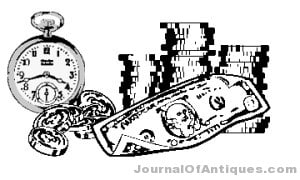The Best of Ed Welch – Your Time and Your Money
The Business of Doing Business in Antiques
By Ed Welch

The antiques trade is time and money intensive. No professional dealer can make a living wage in the antiques trade unless he or she is willing to work 10 to 12 hours a day six days a week. A professional dealer must have a reserve of cash to buy merchandise and some sort of financial arrangement with a bank that will give the dealer quick access to reserve funds. More on money later. First, a quick look at the time requirements for operating a successful antiques business.
I had great success buying at the spring Brimfield show. This was surprising in that all my major competition was at the show. I do not sell at Brimfield, I buy at Brimfield. All my major competitors also buy at Brimfield, none sell.
When a person enters the antiques trade, he or she must decide how the number of hours devoted to the antique business will be spent. Generally, if the business is full-time, the owner must work between 60 and 80 hours each week. No small business owner can make money working 40 hours a week.
The owners of family restaurants, Ma and Pa convenience stores, dry cleaning businesses, auto repair shops, self-employed plumbers, electricians, building contractors, and other family owned businesses work between 60 and 80 hours each week. An antiques business, as a single owner business, is not exempt from the number of working hours required to make such a business successful.
Many antique dealers choose to spend most of their weekly work hours selling or getting items ready to sell. An active full-time show dealer can easily do more than 30 shows a year, some do one show each week.
Dealers who go south in the winter can do a different show or flea market every single day. Dealers, who choose to spend most of their time selling, must become experts at buying. Such dealers spend a large amount of time and money in the selling process. They must develop a buying process that allows them to buy quickly and cheaply.
Some dealers, myself included, choose to spend every hour of every day buying. I began the May Brimfield at midnight on May 7. I drove to Brimfield arriving at 5 a.m. I bought all day Monday, Tuesday, Wednesday, Thursday, and Friday.
On the following Thursday, May 18, I went on my second major buying trip in two weeks. I visited shops in southern Maine, Northwood, New Hampshire and Quechee, Rutland, Chester, Manchester, Putney and Brattleboro in Vermont. I returned home through Keene and Milford, New Hampshire. I spent four days on the road.
Because I spend many hours each week buying, I have more opportunities to find the things I want at prices low enough to allow me to make a profit. Dealers like me spend very little time or money selling. Many such dealers are open a few hours one day each week. A few sell by invitation one day every month. Personally, I sell just two weeks each year, the first week in April and the first week in November. My selling events are private. You must have an invitation. Why anyone would go out of his or her way to buy from me, or dealers like me, is fodder for another article.
Many dealers try to do the impossible, buy and sell at the same time. Usually, this strategy does not work. Both the buying and the selling suffer from lack of attention. How many times have you tried to buy something from an absent dealer at Brimfield? Generally, neighbors of that dealer will tell you that he or she is out shopping in another field.
One more thought on time spent in the antiques trade. How much money do you want to make per hour? Are you willing to work for minimum wage or less? Do you want to make $10 or $20 an hour? Is your goal $50 an hour?
I was fortunate in that I had several excellent teachers while in High School. One economics teacher would be fired today if he taught in the same manner he taught back then. His methods would not be considered politically correct.
The teacher said something that still rings in my ears today. “Everybody in this class, each of you, will sell yourself to the highest bidder and,” he added, “you will do so over and over again for your entire life.”
“The reason you are in this class, this high school, is not to earn a diploma. A diploma is worthless. It is not worth the paper it is written on. The reason you are here is to gain knowledge and skills so that you are worth more money to a potential employer. The more education you have, and the more skills you master, the more money you will be able to get when you sell yourself.”
Skip school, cut classes, fail to study, do not do your homework, and you will pay out of your own pocket several dollars for every hour you work for the rest of your life.
I worked 65 hours Brimfield week and 32 hours on my Vermont buying trip. I stayed in hotels six nights at $89 per night. I used five tanks of gas at $50 per fill-up. I ate 27 meals on the road. Typically, each meal cost between $8 and $15. If I were to work for minimum wage, my income would not cover my expenses.
If you are a show dealer, keep track of your expenses and the time spent in preparation and at the show. Check to see if you are working for minimum wage. A dealer can modify his or her business by changing the types of items sold, the average value of items sold, and the quality of shows. Buying methods can be altered, selling methods can be changed. Maybe a combination of shows, group shops, and auctions will work best for you. Do not overlook Internet sales and purchases.
A person can become an antiques dealer, buy stock, and begin selling at a mall or show in less than a month. It takes several years of public selling and good record keeping to develop a private selling system. Public selling requires much time and money spent on selling. Private selling requires much time and money spent on buying. I am, in fact and function, a highly paid personal buyer for the collectors and dealers who buy from me.
If you do not like to put your money at risk, you will never make big money in the antiques trade. The antiques trade is money intensive. Unless you deal at the low levels of the trade, $1,000 is pocket change.
I recently left five absentee bids at auctions, three bids at local auctions and two at Internet auctions. I won all five items. My total cost for the five items was nearly $4,000. Add to this the thousands I spent at Brimfield and on my Vermont buying trip.
As I have said, I sell only two weeks each year. My next selling event is in the first week of November, five months from now. I will spend many thousands of dollars stocking up for this sale. I fund my business with the equity in my home and in a commercial warehouse that I own. I also have a line of credit that I can tap.
Thirty five years ago, I funded my business with cash. I built working capital by adding ten percent of the profit on items I sold to my War Chest. This funding method worked well when I was a level three dealer. However, when I decided to add a level eight category to my business, cash funding did not work at all.
Placing my home and warehouse at risk was not an easy decision to make. Borrowing money to buy antiques is not an easy decision to make. This type of antiques trading is similar to investing in the stock market. It is possible to make large profits. It is also possible to suffer large losses.
To be successful at all levels of the antiques trade, good record keeping is essential. A dealer must know how much it costs just to operate the business. Buying expenses need to be tracked. Selling expenses need to be tracked. Advertising and restoration expenses need to be tracked. In addition, dealers must keep track of their time so that they do not end up working for less than minimum wage.
If you are in the antique trade for fun, for prestige, for something to do, or as a hobby, it is perfectly acceptable to work for little or nothing. However, if you are in the antiques trade to make a living, part-time income, or extra income in retirement, knowing your hourly wage is important.
Divide your net profit into the number of hours worked. If the figure is too low, take a close look at your buying and selling methods. Many times small changes in buying and selling methods will increase net profits.
As many of you are aware, our friend Ed Welch passed away in October, 2012. His wisdom and entrepreneurial spirit will be greatly missed. At the request of many of our loyal readers we’ve decided to publish some of their favorite columns from past years.





Related posts: